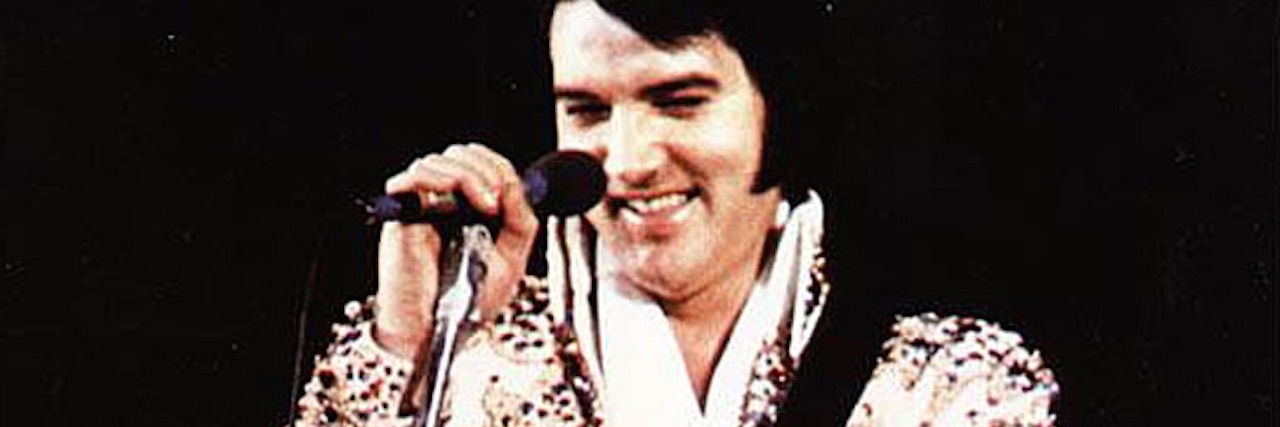Why I Felt Like an ‘Elvis Monster’ at the Height of My Illness

Over the span of one spring to the next, I unwittingly transformed from a fit, young(ish) mother, committed to healthy eating and exercise, into what, in retrospect, I describe as “Elvis Presley circa 1977.” This is the year The King died an overweight icon with blood pressure higher than Priscilla Presley’s 60’s beehive.
I too, grew overweight despite no changes to my diet and working out seven days a week. I couldn’t sleep more than four, sometimes as little as two, hours a night no matter what pill I took or method I tried. My eyebrows grew into my temples like a cave woman. I had a mustache. I was balding. My once low blood pressure spiked. I was on edge and overcome with anxiety. My bones felt like dust. I bruised if I bumped into a butterfly. I became hunchbacked and looked twenty years over my 31 years of age. Dementia gripped my mind. I didn’t feel like myself. In other words, in my mind, I felt as if I had become a “monster.” And life was hell.
It was me, the real me, trapped inside this “Elvis Presley-like demon,” and screaming in a tiny, muffled ant-like voice for someone to get me out of there. Elvis-me regularly disgusted the real me, like when he couldn’t pick up on social cues and took overly-long pauses when talking, stared too hard, wreaked badly of body odor. Or when he’d greedily pick every last chocolate-covered peanut and other fallen goodies from the grate underneath the bulk food dispensers. Not to mention the days when he’d buy a rotisserie chicken and eat nearly the whole thing, hot grease dripping down his bear hands while still in the parking lot. He even, exactly like the real Elvis, was a big fan of all things peanut butter and banana. Probably due to a sodium/potassium imbalance and the haunting feeling of insatiable hunger. Therefore, Elvis-me positioned himself to always be within ten feet of a fresh banana, a jar of peanut butter and a spoon. Thus, often wearing crusted peanut butter, and sometimes banana, on the front of his shirt and in his hair.
Once he even attacked a sycamore tree in his backyard with a rake out of sheer rage, tearing off sheets of its paper-bark. It took so much out of him, he visited the doctor the next day for fear he was having a heart attack.
Elvis-me also had (what he thought were) a lot of ingenious ideas. Unlike the real me, he was very talented at convincing others to support his brilliant plans. By the end of Elvis-me’s occupation of my body, he’d convinced my real self that whatever my problem was, it could be fixed if I could just make enough lists. He became quite spiritual, and suspected he knew the true meaning of all existence (at last). He also persuaded my husband and myself to quit his high-paying, successful career and we would both work part-time, splitting childcare fifty/fifty.
Unfortunately, a week after my husband quit his job, I woke and set out for my morning stroll, quickly discovering I was unable to walk more than a few steps before my legs, along with my last shred of hope that I’d ever be healthy again, crumbled to the ground. I could no longer work or take care of my two-year-old, and the doctors where I lived didn’t seem to know what to make of my extravagant list of ailments. So I took a flight out the next day to be near my parents while I sought serious medical attention.
After a trip to the ER, I finally found out the cause of all the Elvis-symptoms over the past year. It was Cushing’s Syndrome caused by a malignant grapefruit-sized tumor on my adrenal gland. Adrenal cortical carcinoma, a stage IV cancer.

Adrenal cancer is considered an extremely rare “orphan” cancer, because like many orphans, it feels like nearly the whole world wishes you the best, but won’t do a thing to help you. A cancer diagnosed to one in a million souls, that’s three hundred Americans per year. Untreatable once this cancer hits stage IV, you have a less than five percent chance of living five years after diagnosis.
Despite the almost certain early death sentence, I felt largely relieved to finally know who this Elvis was. And to confirm there really was an Elvis, that it wasn’t truly me in charge of my body all that time. The hijacker of my body was, in fact, a flood of cortisol, the “fight or flight” hormone responsible for regulating stress, sleep/wake cycles, metabolism, menstruation and immunity, among other things. And once I realized the problem, I knew solutions would come, no matter how crummy the odds.
I knew once I had surgery to remove the main tumor and I recovered from Cushing’s, I’d start to feel like myself again. And even if I died sooner rather than later, I would die as my real self. I would have enough borrowed-time to unravel and process my year’s-worth of experiences trapped inside Elvis. I would then do my best to make up for the year of “beast-like” behavior, to the few dedicated people still present in my life, as best I could with a long period of normal behavior controlled by the real me. This way I might avoid dying like Elvis, leaving behind a name synonymous with unfavorable behavior.
The Cushing’s and Elvis-me have since subsided, leaving me a worn, yet sane, version of my former self. But I will not soon forget that time when I knew what it felt like to be a fallen king, to go from something to nothing — to be rejected for my mood swings, “puffy” face, bloated stomach, and my ramblings and incoherence.
Because, in my opinion, this is what we do. We meet a stranger who is appears to be “monster-like” in our minds, someone we don’t feel comfortable with, someone who scares us. We calculate at a glance how many categories of “normal” they don’t fit into, and treat them with the least amount of respect without being completely disrespectful. In essence, we often reject them.
I too, am guilty of these same thoughts and actions.
But now I know precisely what it feels like to want so badly to feel “normal,” but being constantly brushed aside due to a strange outward appearance. I realize Cushing’s is rare, and adrenal cancer even rarer. I know I will probably never meet someone with my same diagnosis. But I cannot help but wonder if what was true of my “monster-likeness” is true of how others may feel as well. They may not have Cushing’s, but there is a “real-me” inside each person whose illness has changed their appearance or behavior, a person who still needs and deserves compassion and care.
And I wonder just how many others who experience their body and mind being “taken over,” would have a better outlook if just a few of us took a moment or two to think this way.

